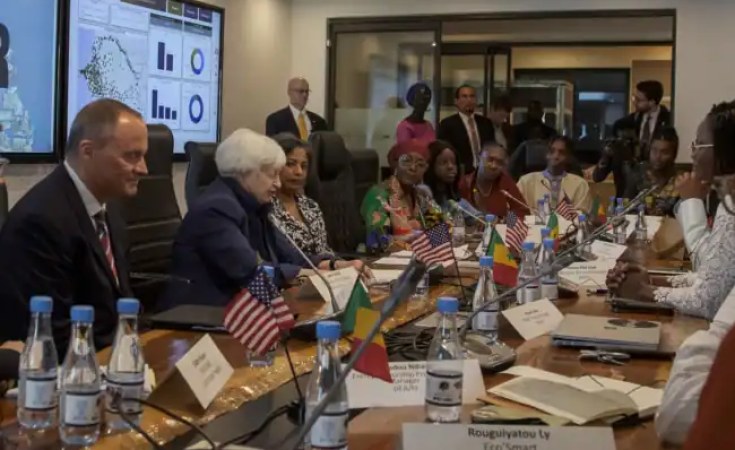Washington — Top Chinese, Russian and American officials are scrambling this month to visit African nations and pledge their commitment to the world's fastest-growing continent.
As President Joe Biden prepares for a visit later this year, several of his top officials have recently visited Africa. There, they must balance the desire to secure the continent's support against Russian aggression and Chinese ambitions with their promise to work to benefit Africa.
Washington says this is not about countering Russian and Chinese ambitions -- though the U.S. has expressed dismay over African nations' reluctance to condemn Russia's invasion of Ukraine -- but about building meaningful relationships in areas such as business, health, peace and security.
"Our partnership in Africa is not about -- about other nations," White House press secretary Karine Jean-Pierre said in response to a question from VOA. "Our partnership there, it's -- as demonstrated by our commitments at the U.S.-Africa Leaders' Summit -- the United States sees African countries as genuine partners and wants to build relationships based on mutual respect."
But the continent's top diplomat says Africa, which was brutally colonized by European powers for centuries, is no one's pawn. And, he pointedly added, China understands that.
"Africa refuses to be seen as an arena for influence struggles," said African Union Commission chairperson Moussa Faki. "We are open to cooperation and partnerships with everyone, as long as they respect our principles, our priorities and our interests. The partnership we have with China is built on these principles."
But as the most senior visiting U.S. official said recently, these great-power rivals are keenly aware of each other's activities, especially as China and Russia flex their muscles globally.
"Many African countries are now plagued by high and unsustainable debt, and that's undeniably a problem, and much of it is related [to] Chinese investment in Africa," said U.S. Treasury Secretary Janet Yellen, the latest U.S. official to visit. "So, I think that's simply a factual statement. But this is not for us. This is not a competition with China. We want to deepen our engagement with Africa."
Analysts say these two goals -- real partnership, but also great power competition -- are not mutually exclusive.
"We want to check the ambitions of an expanding Russia and an expanding China, but we also want to see African countries collectively develop more of a political voice for themselves in international fora and create prosperity for their citizens at home," said Cameron Hudson, who researches Africa at the Center for Strategic and International Studies.
"So, all of these things can be true at the same time. However, we're not acknowledging that truth. We are acknowledging only one truth, which is that we want to see Africa develop. And I think it's just more complicated than that."
Analysts estimate that China has spent more than $1 trillion on its global Belt and Road Initiative, which builds infrastructure in the developing world. China maintains a strict stance of noninterference in other countries' internal affairs.
During his first trip on the job, China's new foreign minister rejected the notion of the continent as an ideological battleground, as it often was during the Cold War.
"No country, no people, have the right to force African countries and its people to take sides," said Chinese Foreign Minister Qin Gang. "Africa should be a platform for international cooperation, not an arena for competition between major countries."
The next top American official to visit in coming days will be Biden's ambassador to the United Nations, who previously oversaw the continent at the State Department.
And then, presumably, Biden himself. The White House said this week in response to a question from VOA that there are no concrete plans to announce yet.
Biden has framed the 11-month conflict in Ukraine as a fundamental struggle between democracies and autocracies. With Africa showing clear signs of democratic backsliding, Hudson wonders if Biden will keep those ideals in the forefront when he's on African soil.
"Is he going to stick to those kinds of fundamental principles, which he says he holds, and have a very frank and honest and open dialogue with African states, criticizing them when it's required, keeping the distance when it's required?" Hudson asked.
"Or will he kind of ignore that or put that on a back burner so that he can build relationships that might advantage Washington at the U.N. or down the road politically?"


